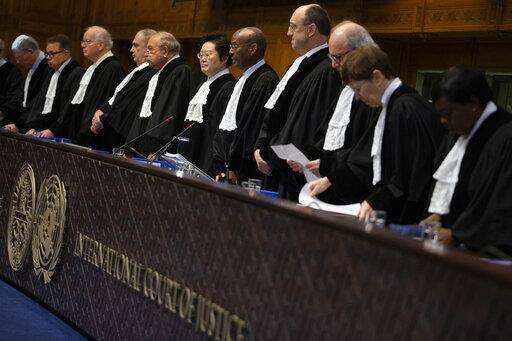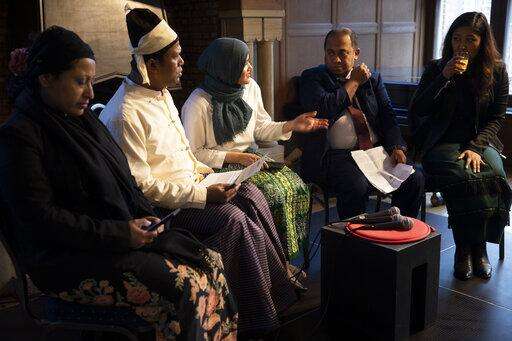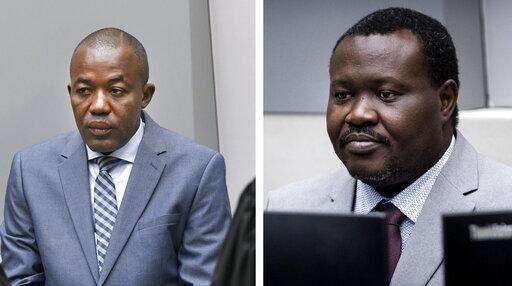Myanmar's leader Aung San Suu Kyi waits to address judges of the International Court of Justice on the second day of three days of hearings in The Hague, Netherlands, Wednesday, Dec. 11, 2019. Aung San Suu Kyi will represent Myanmar in a case filed by Gambia at the ICJ, the United Nations' highest court, accusing Myanmar of genocide in its campaign against the Rohingya Muslim minority. (AP Photo/Peter Dejong)
The Associated Press
THE HAGUE, Netherlands (AP) - Nobel Peace Prize winner and former political prisoner Aung San Suu Kyi denied Wednesday that Myanmar's armed forces committed genocide, telling the United Nation's top court that the mass exodus of Rohingya people from the country she leads was the unfortunate result of a battle with insurgents.
The image of the former pro-democracy icon appearing before the International Court of Justice to defend the army that kept her under house arrest for 15 years was striking. Suu Kyi, who as Myanmar's state counselor holds an office similar to prime minister, was awarded the 1991 peace prize in absentia for championing democracy and rights under the nation's then-ruling junta.
Myanmar's accusers have described a deliberate campaign of ethnic cleansing and genocide that drove more than 700,000 Rohingya to neighboring Bangladesh.
Addressing the world court in The Hague in her role as Myanmar's foreign minister, Suu Kyi calmly attempted to refute allegations that army personnel killed civilians, raped women and torched houses in 2017.
She said the allegations stemmed from 'œan internal armed conflict started by coordinated and comprehensive armed attacks ... to which Myanmar's defense services responded. Tragically, this armed conflict led to the exodus of several hundred thousand Muslims.'ť
Rohingya representatives and rights group said they were appalled by Suu Kyi's testimony.
'œThe world will judge their claim of no genocide with evidence," said Mohammed Mohibullah, chairman of the Arakan Rohingya Society for Peace and Human Rights. "A thief never admits he is a thief, but justice can be delivered through evidence.'ť
The African nation of Gambia brought the legal action against Myanmar on behalf of the 57-country Organization of Islamic Cooperation. Gambia alleges that genocide occurred and is still ongoing.
It requested an emergency legal hearing asking the International Court of Justice to take action to stop the violence, including 'œall measures within its power to prevent all acts that amount to or contribute to the crime of genocide'ť in Myanmar.
Suu Kyi insisted that Gambia provided 'œan incomplete and misleading factual picture'ť of what happened in Myanmar's northern Rakhine state, saying developments in one of Myanmar's poorest regions were 'œcomplex and not easy to fathom.'ť
She detailed how the army responded on Aug. 25, 2017 to attacks by insurgents trained by Afghan and Pakistan extremists.
Suu Kyi said the armed forces had tried 'œto reduce collateral damage'ť during fighting in 12 locations. Conceding that excessive force might have been used and that one helicopter may have killed 'œnon-combatants,'ť she said Myanmar is investigating what happened and should be allowed to finish its work.
'œCan there be genocidal intent on the part of a state that actively investigates, prosecutes and punishes soldiers and officers who are accused of wrongdoing?'ť she asked the court.
Rights groups joined Rohingya representatives in slamming the claims Suu Kyi and Myanmar's legal team made in The Hague.
George Graham, humanitarian advocacy director at Save the Children, said Suu Kyi's remarks 'œfly in the face of all the evidence gathered by the U.N., and the testimony our own teams have heard from countless survivors.'ť
'œRohingya families have faced patterns of unimaginable horrors in a campaign of violence. Children and their parents have been systematically killed, maimed and raped,'ť he said, adding that 'œthe government of Myanmar has failed at every turn to punish those responsible.'ť
Amnesty International's Nicholas Bequelin, accused Suu Kyi of trying to downplay the severity of crimes committed against the Rohingya and 'œwouldn't even refer to them by name or acknowledge the scale of the abuses. Such denials are deliberate, deceitful and dangerous.'ť
'œThe exodus of more than three quarters of a million people from their homes and country was nothing but the result of an orchestrated campaign of murder, rape and terror,'ť he said.
The U.S., meanwhile, slapped economic sanctions on four Myanmar military officers suspected of human rights violations. It sanctioned Min Aung Hlaing, commander of Myanmar's armed forces, over allegations of serious rights abuses. Deputy commander Soe Win and two other military leaders, Than Oo and Aung Aung, were also targeted.
'œThere are credible claims of mass-scale rape and other forms of sexual violence committed by soldiers under Min Aung Hlaing's command," a U.S. Treasury statement said Tuesday.
The court's hearings are scheduled to end on Thursday, when Myanmar and Gambia will have 90 minutes each to wrap up their cases.
___
Cook reported from Brussels. Associated Press reporter Suzauddin contributed to this story from Cox's Bazar, Bangladesh.
Myanmar's leader Aung San Suu Kyi addresses judges of the International Court of Justice for the second day of three days of hearings in The Hague, Netherlands, Wednesday, Dec. 11, 2019. Aung San Suu Kyi will represent Myanmar in a case filed by Gambia at the ICJ, the United Nations' highest court, accusing Myanmar of genocide in its campaign against the Rohingya Muslim minority. (AP Photo/Peter Dejong)
The Associated Press
People read newspapers with front pages leading with Myanmar leader Aung San Suu Kyi at the International Court of Justice hearing near a roadside journal shop Thursday, Dec. 12, 2019, in Yangon, Myanmar. Suu Kyi testified to the court that the exodus of hundreds of thousands of Rohingya Muslims to neighboring Bangladesh was the unfortunate result of a battle with insurgents. She denied that the army had killed civilians, raped women and torched houses. (AP Photo/Thein Zaw)
The Associated Press

A man looks through newspapers with front pages leading with Myanmar leader Aung San Suu Kyi at the International Court of Justice hearing, near a roadside journal shop Thursday, Dec. 12, 2019, in Yangon, Myanmar. Suu Kyi testified to the court that the exodus of hundreds of thousands of Rohingya Muslims to neighboring Bangladesh was the unfortunate result of a battle with insurgents. She denied that the army had killed civilians, raped women and torched houses. (AP Photo/Thein Zaw)
The Associated Press

Presiding judge Abdulqawi Ahmed Yusuf of Somalia, fifth from right, and other judges open the second day of three days of hearings in the case brought by Gambia against Myanmar at the International Court of Justice for the second day of three days of hearings in The Hague, Netherlands, Wednesday, Dec. 11, 2019. Myanmar's leader Aung San Suu Kyi represented Myanmar in a case filed by Gambia at the ICJ, the United Nations' highest court, accusing Myanmar of genocide in its campaign against the Rohingya Muslim minority. (AP Photo/Peter Dejong)
The Associated Press

Yasmin Ullah, center, and other representatives of the Rohingya community take their seats for "Right of Reply" after two days of hearings at the International Court of Justice in The Hague, Netherlands, Wednesday, Dec. 11, 2019. Myanmar leader Aung San Suu Kyi defended Myanmar Wednesday and denied genocide accusations against the Rohingya Muslim minority in a case filed by Gambia at the ICJ, the United Nations' highest court. (AP Photo/Peter Dejong)
The Associated Press

FILE - In this combination file photos taken on Friday Nov. 23, 2018, left and Friday, Jan. 25, 2019, Alfred Yekatom, left, a Central African Republic lawmaker and militia leader who goes by the nickname Rambo, and the chief of Central African Republic's soccer federation Patrice-Edouard Ngaissona appear before the International Criminal Court, ICC, in The Hague, Netherlands. International Criminal Court judges have ordered two alleged leaders of a predominantly Christian militia involved in a bitter conflict with Muslim forces in Central African Republic to stand trial on charges of war crimes and crimes against humanity. (Piroschka van de Wouw/ Koen Van Well/Pool via AP, File)
The Associated Press

Buddhist monks holding portraits of Myanmar leader Aung San Suu Kyi stand on stage to pray as they gather in front of City Hall Tuesday, Dec. 10, 2019, in Yangon, Myanmar. The International Court of Justice in The Hague on Tuesday began a hearing into allegations of genocide in Myanmar over the military campaign against the Rohingya minority, with Suu Kyi set to defend those who once held her under house arrest. (AP Photo/Thein Zaw)
The Associated Press
Supporters of Myanmar's leader Aung San Suu Kyi hold and wear her picture outside the International Court of Justice on the second day of three days of hearings in The Hague, Netherlands, Wednesday, Dec. 11, 2019. Aung San Suu Kyi will represent Myanmar in a case filed by Gambia at the ICJ, the United Nations' highest court, accusing Myanmar of genocide in its campaign against the Rohingya Muslim minority. (AP Photo/Peter Dejong)
The Associated Press
Myanmar's leader Aung San Suu Kyi, right, and legal advisor Prof. William Schabas of Canada, second left, admire the ceiling of the court room prior to addressing judges of the International Court of Justice for the second day of three days of hearings in The Hague, Netherlands, Wednesday, Dec. 11, 2019. Aung San Suu Kyi will represent Myanmar in a case filed by Gambia at the ICJ, the United Nations' highest court, accusing Myanmar of genocide in its campaign against the Rohingya Muslim minority. (AP Photo/Peter Dejong)
The Associated Press
Supporters hold Myanmar flags and portraits of leader Aung San Suu Kyi march on a street toward City Hall Tuesday, Dec. 10, 2019, in Yangon, Myanmar. The International Court of Justice in The Hague on Tuesday began a hearing into allegations of genocide in Myanmar over the military campaign against the Rohingya minority, with Suu Kyi set to defend those who once held her under house arrest. (AP Photo/Thein Zaw)
The Associated Press
Myanmar's leader Aung San Suu Kyi waits to address judges of the International Court of Justice for the second day of three days of hearings in The Hague, Netherlands, Wednesday, Dec. 11, 2019. Aung San Suu Kyi will represent Myanmar in a case filed by Gambia at the ICJ, the United Nations' highest court, accusing Myanmar of genocide in its campaign against the Rohingya Muslim minority. (AP Photo/Peter Dejong)
The Associated Press
Yasmin Ullah and other representatives of the Rohingya community take their seats for a "Right of Reply" meeting after two days of hearings at the International Court of Justice in The Hague, Netherlands, Wednesday, Dec. 11, 2019. Myanmar leader Aung San Suu Kyi defended Myanmar Wednesday and denied genocide accusations against the Rohingya Muslim minority in a case filed by Gambia at the ICJ, the United Nations' highest court. (AP Photo/Peter Dejong)
The Associated Press
Locals read through newspapers with fronts leading with Myanmar leader Aung San Suu Kyi at the International Court of Justice hearing outside a roadside shop Thursday, Dec. 12, 2019, in Yangon, Myanmar. Suu Kyi testified to the court that the exodus of hundreds of thousands of Rohingya Muslims to neighboring Bangladesh was the unfortunate result of a battle with insurgents. She denied that the army had killed civilians, raped women and torched houses. (AP Photo/Thein Zaw)
The Associated Press